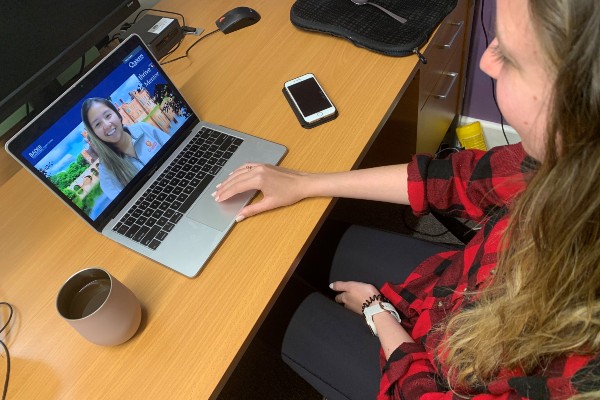Connecting with England from home
November 12, 2020
Share

The Bader International Study Centre (BISC) has plenty of appeal for students looking to combine the Queen’s experience with international learning. At the BISC, students enjoy small class sizes in the incomparable surroundings of a 15th-century English castle and have easy access to many British and European cultural institutions.
As a study abroad centre, however, the BISC faced unique challenges when COVID-19 made it impossible to welcome students in person. In response, the centre’s faculty and staff have found innovative ways to bring the study abroad experience to this year’s cohort of students enrolled in the BISC.
“When COVID-19 hit, we had discussions to articulate what makes the BISC experience valuable beyond studying overseas in a castle. Through engaging our faculty, students, staff, and alumni, we identified our core qualities and have tailored our remote programming to emphasize them,” says Christian Lloyd, Academic Director of the BISC. “We look forward to welcoming students back to England in the future, but, in the meantime, they can still enjoy the tight-knit community, small class sizes, and global perspectives that define the BISC.”
To deliver the BISC experience from overseas, the centre developed online courses with small class sizes that feature virtual experiential learning opportunities through British cultural and science institutions. Students in a biology course, for example, have learned through online materials at The Wellcome Genome Campus in Hinxton, while students in a film course have used virtual collections at the Hove Museum in southeast England.
The BISC has also turned to new ways to form community. They have provided each student with a personal success coach, a staff or faculty member who meets with the student regularly to help them set goals for the semester and find the wellness resources available to them. Making sure students connected with their peers at the start of the term, the BISC organized a virtual escape room set in several of the atmospheric rooms of Herstmonceux Castle. The vibrant student-club scene at the BISC has also continued in the virtual environment.
“Everyone is really bonding together. Even though we’re spread out all over the world, we’ve formed a community and know each other by name. Student Services has done an amazing job running events to give us the chance to ‘hang out’ outside of classes,” says Kyra Mevis, a first-year student in the BISC program. “The professors have also been so kind and accommodating, and have really gone above and beyond to make their classes the best they possibly can be.”
Increasing access to the BISC
The BISC has even brought their programming to a new audience, as their flagship first-year course is being offered to first-year and upper-year Queen’s students not enrolled at the BISC for the first time. BISC 100 focuses on “Thinking Locally” in the fall and BISC 101 explores “Acting Globally” in the winter. By teaching interdisciplinary methods of primary source analysis – using materials from the Herstmonceux Castle archives – the course lays the groundwork for many different programs students might go on to pursue at Queen’s.
“This fall, we have 50 students in BISC 100 from the main campus, and they would not have had a chance to take the course before. We’re pleased to make the BISC and its resources more accessible and aim to continue to find new ways to expand our reach even after we can welcome students in person again,” says Lloyd.
Enrolment for the winter term opens on Nov. 9. Students can enroll in BISC 101 whether or not they have taken BISC 100 in the fall. Queen’s upper-year students can also enrol in the BISC upper-year courses that will be offered online for winter term 2021.
Learn more on the BISC website.